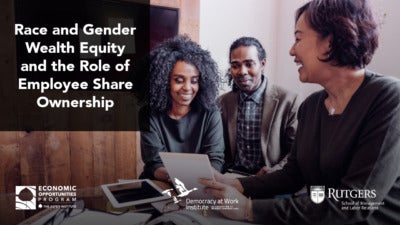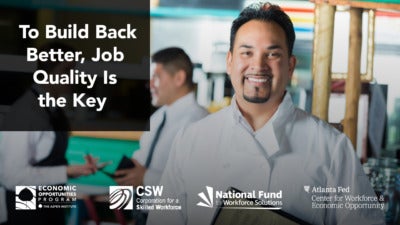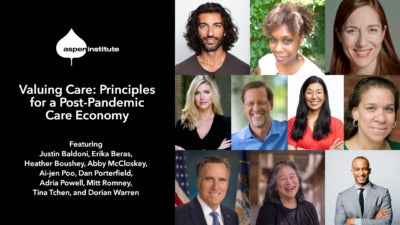At the Aspen Institute Economic Opportunities Program, and for our many colleagues and partners, the ongoing and intertwined health, economic, and racial justice crises bring new urgency to our work to improve access to quality jobs, options to participate in business ownership, and the freedom to pursue economic opportunity. Below we share our monthly newsletter with highlights of recent work. As always, we welcome your feedback, thoughts, and partnership in advancing inclusive opportunity and an economy in which we all can thrive. Click here to subscribe.
Click here to view past editions of our newsletter.
News and Updates

Race and Gender Wealth Equity and the Role of Employee Share Ownership
Even before the pandemic, many workers struggled to build wealth. Divisions between men and women, and between white households and households of color, are particularly striking. The pandemic has exacerbated and heightened awareness of these inequities, and there is a mounting sense of urgency to find practical solutions. Increasing participation in business ownership can help address this wealth divide, strengthen job quality, and boost business performance, so that businesses and workers succeed together. This issue brief, “Race and Gender Wealth Equity and the Role of Employee Share Ownership,” makes a case for why policymakers, funders, and investors who care about racial and gender wealth equity should support employee share ownership. It provides a set of concrete policy and practice ideas to expand employee ownership and advance equity and economic justice. Read more.

To Build Back Better, Job Quality Is the Key
The United States has a problem—too few quality jobs—which contributes to a variety of national ills, from low productivity to poor health, to fractured politics and divisions within society. In “To Build Back Better, Job Quality is the Key,” EOP Executive Director Maureen Conway, Jeannine LaPrad (Corporation for a Skilled Workforce), Amanda Cage (National Fund for Workforce Solutions), and Sarah Miller (Federal Reserve Bank of Atlanta) make the case that improving job quality should be a central goal of economic recovery and rebuilding efforts, and they lay out practical policy ideas toward that end. The report includes a framework illustrating the multiple dimensions of job quality and outlines the variety of institutions and organizations that can play a role in improving job quality. Read more.

Valuing Care: Principles for a Post-Pandemic Care Economy
On April 21, we hosted a special two-hour event, Valuing Care: Principles for a Post-Pandemic Care Economy. The event featured an exciting lineup of policy and practice experts, legislative leaders, and cultural leaders who spoke to the important role of caregiving in our economy and society. Speakers shared a variety of ideas for building an equitable care economy both in the near term for recovery and in the long term for a post-pandemic future. Our special guests included Justin Baldoni (Wayfarer Studios), Erika Beras (Marketplace), Heather Boushey (White House Council of Economic Advisers), Abby McCloskey (McCloskey Policy LLC), Ai-jen Poo (National Domestic Workers Alliance; Caring Across Generations), Dan Porterfield (The Aspen Institute), Adria Powell (Cooperative Home Care Associates), Mitt Romney (US Senator from Utah), Tina Tchen (TIME’S UP), and Dorian Warren (Community Change; Economic Security Project). Watch, listen, and learn more.

Improving Job Quality and Equity for All
As the pandemic has accelerated automation in the workplace, it has become even more important to consider ways to maximize the positive impacts of these technologies while minimizing the risks. What if automation could improve job quality for everyone? On March 31, EOP Executive Director Maureen Conway took part in a discussion, “Improving Job Quality and Equity for All: Implications of Work Automation and Augmentation,” hosted by the OECD Washington Center. Conway and her fellow panelists— Jeremias Adams-Prassl (University of Oxford; Global Future Council on the New Agenda for Work, World Economic Forum), Leticia Gasca (Faethm AI), Audrey Plonk (OECD), and moderator Shalin Jyotishi (New America)—discuss how we can make the future of work more equitable, efficient, and enjoyable. Click here to watch.

Speaking on the Future of Work
Hilary Greenberg, senior research associate for the Future of Work Initiative, lent her insights to the OECD’s “I am the Future of Work” campaign, which explores how major shifts taking place in the world of work impact people’s lives. Greenberg was featured on the OECD’s social media channels, including a brief video showcasing her remarks. Click here to watch.
On April 20, Shelly Steward, director of the Future of Work Initiative, facilitated a discussion for Aspen Germany titled “Tech and the Worker: Opening up the Policymaker’s Toolbox,” which also featured Tennessee State Senator Raumesh Akbari, Roy Bahat of Bloomberg Beta, Anna Kopp of Microsoft, an Anja Piel of the German Trade Union Confederation. The conversation, which you can view here, covered policy proposals that address current challenges in our labor market.
Calling for a White House Initiative on Inclusive Economic Growth
On top of the pandemic, the US is grappling with inequities caused by centuries of systemic racism. This month, dozens of organizations, including EOP, called for the creation of a White House Initiative on Inclusive Economic Growth. The initiative would encourage the flow of capital to underserved communities and small businesses, and lift up community and worker voices to advance racial and economic justice. Watch the announcement.
Upcoming Events
EOP will continue to host virtual events and webinars this season. Join our mailing list and follow us on social media to learn when new opportunities are available.

May 3: Just Economy Conference
On May 3, Business Ownership Initiative Director Joyce Klein will take part in a lightning session on EBA Fund at the National Community Reinvestment Coalition’s Just Economy Conference. And on May 5, Future of Work Initiative Director Shelly Steward will speak at a session on the “Future of Work and AI.” Learn more and register.
Join the conversation
Follow EOP on social media to join the conversation!
-Workforce Strategies Initiative @AspenWorkforce
-Business Ownership Initiative @Aspen_BOI
-UpSkill America @upskillamerica
-Future of Work Initiative @AspenFutureWork
About EOP
The Aspen Institute Economic Opportunities Program (EOP) advances strategies, policies, and ideas to help low- and moderate-income people thrive in a changing economy. We recognize that race, gender, and place intersect with and intensify the challenge of economic inequality and we address these dynamics by advancing an inclusive vision of economic justice. For over 25 years, EOP has focused on expanding individuals’ opportunities to connect to quality work, start businesses, and build economic stability that provides the freedom to pursue opportunity. For more information, visit as.pn/eop.
EOP has several initiatives, including the Business Ownership Initiative, Workforce Strategies Initiative, UpSkill America, Good Companies/Good Jobs, and the Future of Work Initiative. In addition, across these approaches EOP hosts the Economic Opportunity Fellows Network and the Opportunity in America event series.
Thank you to our many partners and funders for supporting our efforts.
Support Our Work
We are committed to making our events and publications freely available to everyone who finds them useful. But if you find value in our work and are able to support it, please consider making a tax-deductible donation. Click here to learn more.
Keep in Touch
Click here to join our mailing list. For updates every day, follow us on social media.

